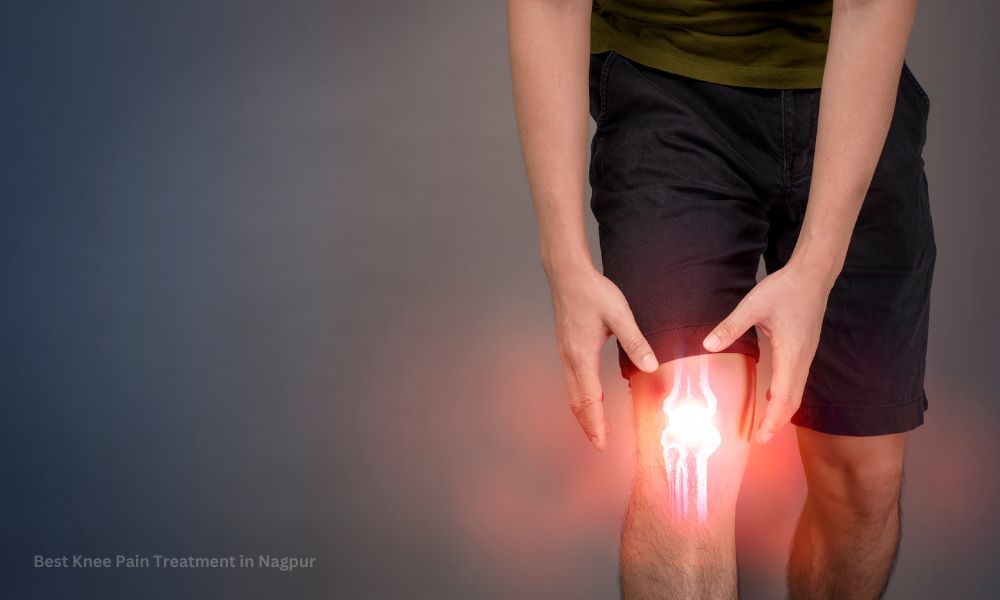Best Knee Pain Treatment in Nagpur for effective relief and recovery

Knee pain is a common issue experienced by many individuals, and it can arise from various causes, such as aging, injury, or conditions like arthritis. Knee problems often result from the wear and tear that naturally occurs over time or sudden movements that place excessive strain on the knee joint. The following are some of the most common knee issues that may require knee pain treatment:
- Sprains and Strains: Knee ligaments and muscles can become sprained or strained due to sudden movements or direct impacts. Common symptoms include pain, swelling, and trouble walking.
- Torn Cartilage: Injury to the knee can cause tears in the menisci, the connective tissues that act as shock absorbers in the joint.. Torn cartilage typically occurs with sprains and may require a knee brace for protection or surgery to repair the tear.
- Tendonitis: Overuse of tendons during activities such as running, jumping, or cycling can cause inflammation. Jumper’s knee, a form of tendonitis in the patellar tendon, is especially common in athletes engaged in sports like basketball.
Arthritis: Osteoarthritis, the most common type of arthritis affecting the knee, involves the gradual breakdown of cartilage. It is more prevalent in older individuals and may worsen with repeated injuries or excess weight. Rheumatoid arthritis, an autoimmune condition that causes joint inflammation and cartilage damage, can also affect the knee.
Causes of Knee Pain
Knee pain can arise from various factors, including injuries (like a torn ligament or damaged cartilage) or medical conditions such as arthritis, gout, and infections. Many cases of mild knee pain can be effectively managed through self-care, physical therapy, and knee braces. However, in more serious cases, surgery may be necessary.
Diagnosis of Knee Pain
To accurately determine the cause of your knee pain, your doctor may recommend several diagnostic tests, which can help guide the appropriate knee pain treatment:
- X-ray: This imaging technique is useful for detecting fractures and degenerative joint conditions, such as arthritis.
- CT Scan: A specialized X-ray that generates detailed cross-sectional images of the knee, assisting in identifying fractures or conditions like gout.
- Ultrasound: Utilizes sound waves to create real-time images of the soft tissues around the knee joint.
- MRI: Provides 3D images, particularly useful in identifying injuries to soft tissues like ligaments, tendons, cartilage, and muscles.
- Lab Tests: If there is suspicion of infection or inflammation, your doctor may conduct blood tests or perform arthrocentesis to analyze fluid samples from the knee joint.
Treatment Options for Knee Pain
The treatment for knee pain will depend on the underlying cause of the discomfort. Available options include medications, physical therapy, injections, or surgical interventions.
- Medications: Your doctor may prescribe pain relievers or medications to address specific conditions causing knee pain, such as rheumatoid arthritis or gout. Nonsteroidal anti-inflammatory drugs (NSAIDs) are frequently used to alleviate pain and reduce inflammation.
- Physical Therapy: Strengthening the muscles around the knee can significantly improve joint stability and reduce pain. A physical therapist may recommend exercises tailored to your condition, including flexibility and balance exercises. For athletes, corrective exercises may help improve technique and prevent further knee injuries. In some cases, arch supports or knee braces can help alleviate pressure from the knee joint.
- Injections: For certain knee conditions, injections may be recommended to directly deliver medications to the joint:
- Corticosteroids: These injections reduce inflammation and can provide relief for several months, though their effectiveness may vary.
- Hyaluronic Acid: This substance, similar to the natural lubricant found in joints, can be injected to improve mobility and reduce pain. The relief may last for as long as six months.
- Platelet-Rich Plasma (PRP): PRP contains growth factors that help reduce inflammation and promote healing, particularly beneficial for conditions like osteoarthritis.
- Surgery: If conservative treatments do not provide relief, surgical intervention may be required:
- Arthroscopic Surgery: A minimally invasive procedure where small incisions are made to insert a camera and surgical instruments to repair torn cartilage, remove debris, or reconstruct damaged ligaments.
- Partial Knee Replacement: Only the damaged portion of the knee is replaced with artificial components. This approach allows for quicker recovery compared to a total knee replacement.
- Total Knee Replacement: When the knee joint is severely damaged, the femur, tibia, and patella are replaced with an artificial joint made of metal alloys and high-quality plastics.
- Osteotomy: In cases of knee misalignment, bone may be removed from the femur or tibia to realign the joint, which can help delay or prevent the need for total knee replacement.
Finding the Best Knee Pain Treatment in Nagpur
In Nagpur, several clinics and hospitals offer specialized care for knee pain. These medical centers use advanced diagnostic tools and treatment methods to effectively address knee pain. Whether you are suffering from an injury, arthritis, or another condition, seeking prompt medical attention can help prevent further damage and improve your quality of life.
Consulting with an orthopedic specialist in Nagpur can help you understand the most appropriate knee pain treatment tailored to your needs. Whether through conservative treatments such as physical therapy and injections or more advanced options like surgery, an orthopedic expert will guide you to the best path for faster recovery and better long-term outcomes.